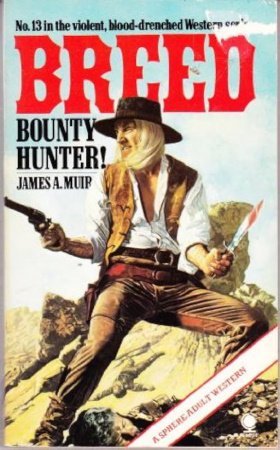Azul fired. The Winchester bucked once in his hands, the heavy slug taking Cole in the face. It went in through his left cheek, slicing through the soft flesh to splinter outwards on the far side at the head of a spray of blood and fragmented chips of molars. Cole’s face twisted sideways under the impact; the aim of S&W spoiled so that the bullet sent splinters from the porch.
Azul levered the Winchester and fired again. The second shot hit higher than the first. It fractured the cheekbone and plucked Cole’s left eye inwards, leaving only a gaping red hole before it tore through his nasal membranes and the lower rim of his brain, exiting from his right temple. A thick column of pale crimson that was flecked through with pieces of bone erupted from the side of the man’s head. A gout of blood burst from his empty eye socket, and from his nostrils there came a twin spurting of scarlet-colored mucus. His head jerked to the side, and as his ruined brain lost control, his body snapped upright, the arms stretching out to drop the S&W as his dying brain lost control of the body’s movements. He straightened up, a wide smear of stinking urine spreading over the front of his pants. Then, like a puppet cut loose of its strings, he crumpled face down in the street. Around his head, the dirt got puddled with blood.
Azul stood up, levering a fresh load into the breech as men came out from the saloon.
‘He dead?’ asked Backenhauser.
‘He’s not moving,’ grunted Azul. ‘I think you’re safe now.’
‘Good.’ The artist stepped down off the sidewalk and went over to the body. ‘I just wanted to be sure.’
He put a foot against Cole’s neck and reached down to grasp the wooden handle sticking out from the dead man’s neck.
‘That’s a good scalpel,’ he said. ‘I’d hate to lose it.’
‘You could lose a whole lot more’n that.’ The barkeep’s voice echoed through the still street. ‘Those two had friends round here. They hear what happened your lives ain’t worth a plugged nickel.’
‘Fair fight,’ said Azul. ‘You saw it all.’
‘Sure it was,’ said the barkeep. ‘I told the little guy to stay clear o’ Wesley an’ Cole. But we don’t have no regular law here, so the closest thing we got is ole man Dumfries, an’ seein’ how he’s the biggest landowner around he’s the next best thing to law.’
‘So?’ Azul asked.
‘So you just killed one o’ his sons an’ his top hand,’ said the bald man. ‘He ain’t gonna like that. More like, he’ll bring some boys in to hang you.’
‘Tell him to find me.’ grunted the half-breed. ‘I was moving on, anyway.’
‘Takin’ yore friend with you?’ asked the barkeep. ‘Dumfries’ll hang him high as you.’
‘Oh my God!’ Backenhauser disappeared inside the saloon.
‘His problem,’ said Azul. ‘I’m riding out.’
No one tried to stop him, and he went down to the stable and fetched the gray stallion out from the stall. He got the animal saddled and fastened the bags in place behind the seat. He was leading the big horse out when Backenhauser showed.
‘Thank God!’ the artist slewed to a panting halt. ‘I hoped you’d still be here.’
‘Why?’ asked Azul.
‘You gotta get me out of here.’ Backenhauser dropped a large leather satchel on the straw and adjusted his derby over his long hair. ‘They’ll kill me else. You heard that barkeep.’
‘Why?’ Azul repeated. ‘Why should I help you?’
‘You done it once before,’ gasped Backenhauser. ‘And I helped you, didn’t I? If I hadn’t put that scalpel in Cole’s back, you’d be dead.’
‘Makes us even,’ said Azul. ‘So you go your way, and I’ll go mine.’
‘Jesus!’ moaned the artist. ‘Don’t you understand? I don’t know where to go. I need someone to show me the way.’
‘There’s a stage,’ said Azul. ‘Isn’t there?’
‘Sure there’s a stage.’ Backenhauser glanced round the stable, staring wide-eyed at the horses. ‘I came in on the stage. That’s how I know there isn’t another in a week.’
‘So take it,’ grunted Azul.
‘I’ll be dead by then,’ wailed the artist. ‘This Dumfries feller could have me hung by then.’
‘I thought you was a painter,’ said Azul. ‘That should please you.’
‘What the hell are you talking about?’ asked Backenhauser. ‘I don’t understand.’
‘I always thought painters wanted to get hung,’ grinned Azul.
‘Not when they’re framed,’ said Backenhauser. ‘Can you help me? Please.’
‘You got money for a horse and saddle?’ asked the half-breed.
The artist nodded enthusiastically, digging into his coat to produce a wad of notes.
‘You pick one for me. I don’t know much about horses. You just choose one. Same for the saddle.’
Azul fetched the stable hand over and asked if he had any animals to sell. The old man led him out back, where he picked a roan gelding that seemed docile enough to accept Backenhauser, and strong enough to make the journey south. Then he bought a second-hand saddle and got it on the roan.
‘All right,’ he said. ‘Let’s go.’
Backenhauser lashed his bags in place and climbed awkwardly astride the pony. Azul watched him fumble with the reins and groaned: it was obvious the man knew nothing about riding. He walked his own mount slowly clear of the stable while the artist followed nervously behind. Outside in the street the crowd was dispersing. A man in a black frockcoat was leading a wagon with two coffins loaded in the rear towards the saloon. He raised his hat as he watched Azul ride away.
‘You ever ridden before?’ asked the half-breed.

























